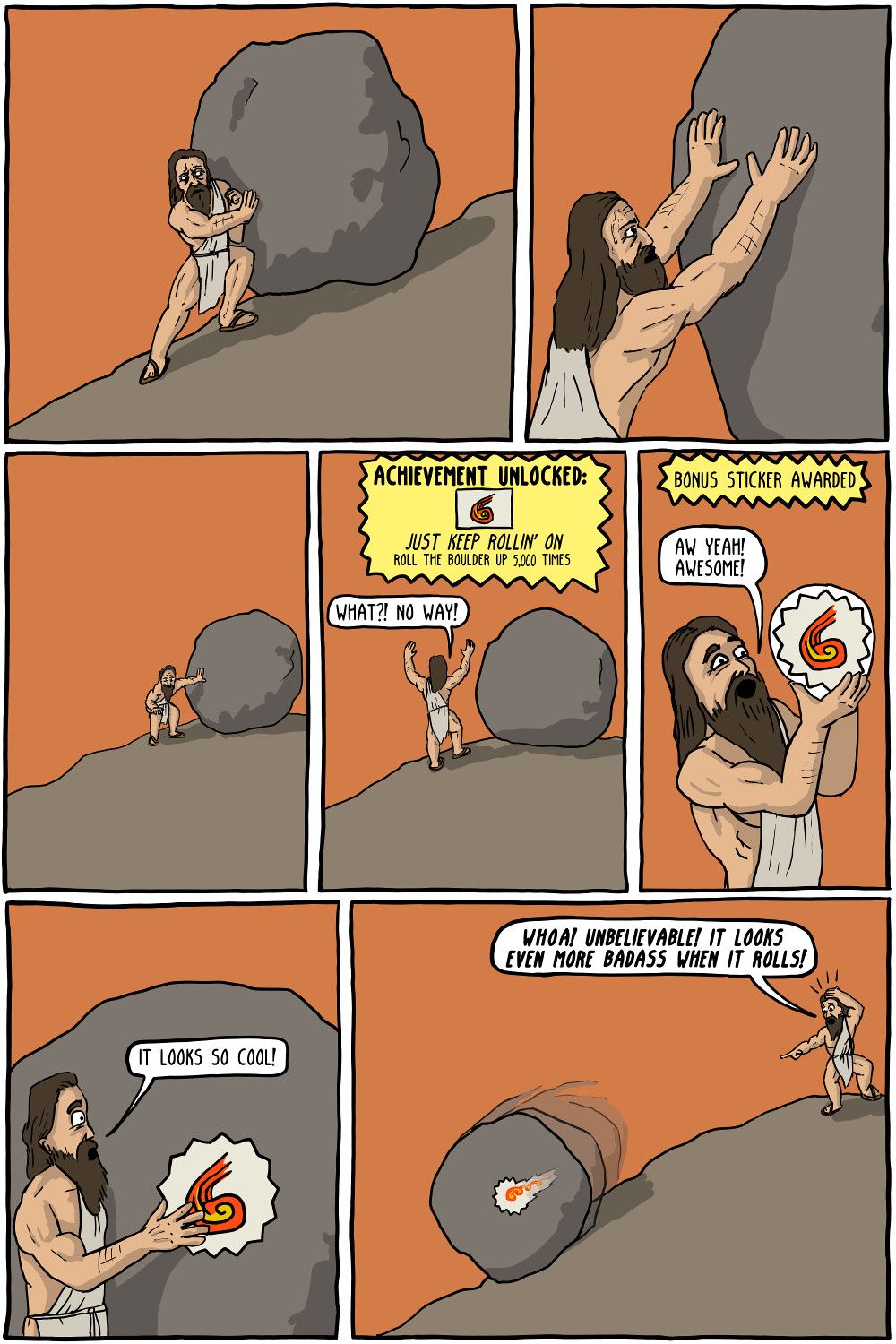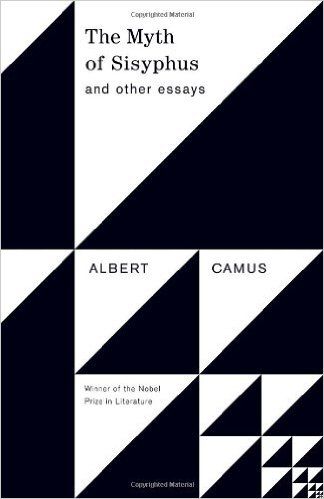Jordan Bates • • 5 min read
21st-Century Sisyphus: Brilliant Comic Asks if Your Life is Meaningless

‘We Must Imagine Sisyphus Happy’
by Existential Comics

Didn’t Get the Joke?
There are a couple of layers to understand here. First of all, one needs to know about the original myth of Sisyphus from Greek mythology. From Wikipedia:
In Greek mythology Sisyphus was a king of Ephyra (now known as Corinth). He was punished for chronic deceitfulness by being compelled to roll an immense boulder up a hill, only to watch it roll back down, repeating this action forever.

So Sisyphus is the unlucky dude in Greek mythology who has to roll a boulder up and down a hill forever. In 1942, the French existentialist philosopher Albert Camus (who did not actually consider himself an existentialist but is generally categorized as one) wrote an essay called “The Myth of Sisyphus.”
In the essay, Camus elaborates his famous philosophy of the absurd. Again, from Wikipedia:
“In the essay, Camus introduces his philosophy of the absurd: man’s futile search for meaning, unity, and clarity in the face of an unintelligible world devoid of God and eternal truths or values. Does the realization of the absurd require suicide? Camus answers: “No. It requires revolt.” He then outlines several approaches to the absurd life. The final chapter compares the absurdity of man’s life with the situation of Sisyphus, a figure of Greek mythology who was condemned to repeat forever the same meaningless task of pushing a boulder up a mountain, only to see it roll down again. The essay concludes, ‘The struggle itself […] is enough to fill a man’s heart. One must imagine Sisyphus happy.'”
So Camus argues that man is faced with an absurd predicament: being a meaning-making creature in an meaningless universe. He compares the human experience and specifically the experiences of the people of his time—spending their lives working futile jobs in factories and offices—with the absurd life of Sisyphus, the tragic hero. Ultimately, he argues that if Sisyphus acknowledges the futility of his task and the certainty of his fate, that he can then be free to recognize the absurdity of his situation and reach a state of contented acceptance.
This, Camus argues, is what we must likewise do in order to reach a state of contentment or happiness. That is, we must recognize the absurdity of our predicament as meaning-making creatures in a meaningless universe in order to reach a place of acceptance of this condition and to be okay with living out the day-to-day details of our existences. Camus concludes the essay by suggesting that “one must imagine Sisyphus happy,” indicating that meditating upon a happy Sisyphus can be instructive in realizing how to be content with one’s own life.
Read this: 'The Wrath of the Sea' by Existential Comics
The Existential Comics Twist
This particular comic from the ever-marvelous Existential Comics is playing with this idea of a happy Sisyphus by imagining that rolling the boulder up and down the hill is a kind of video-game-esque scenario in which Sisyphus can unlock achievements and be awarded stickers and accolades for his endless devotion.
I find this to be a brilliant spin because it can be seen as simultaneously poking fun at human psychology and alluding to a major mechanism of control in modern societies. On one hand, who could argue that it isn’t true that people are often seemingly happy and motivated to chase awards and accolades for arguably meaningless tasks? Just look at the hundreds of millions of people who do spend countless hours playing video games in pursuit of new ranks, achievements, and badges—digital awards worth nothing in “real life.”
I’m not even hating on video games (I like video games). I’m just saying that when seen through this lens of Sisyphus being happy to push the boulder as long as someone’s tossing him a (worthless) trophy every hundred times he reaches the top, our own pursuit of trivial accolades starts to seem kind of foolish, in an unsettling way.
And this phenomenon of empty-accolade-pursuit extends far beyond video games. Just look at people who clearly try very hard to get 100+ ‘likes’ on their latest, uber-happy-seeming profile pic, or people who seek prestige and recognition while working for an unethical corporation, or people whose sole, underlying goal is just to accumulate as much money as possible to show everyone else how awesome and successful they are. To some extent, most all of us are enticed by the idea of being recognized for our efforts, even if our efforts are ultimately meaningless. And Existential Comics is poking fun at that tendency.
The other thing I mentioned that I like about the comic is that it suggests something about how to control people. The comic suggests that if you just dangle a sufficiently shiny carrot before someone’s eyes, they’ll be happy to do whatever you want. If you show someone how good a few ‘likes’ on Facebook feel, they’ll get on Facebook all the time and take hundreds of selfies to try to get the perfect profile pic for a 100-‘likes’ serotonin explosion. And if you present people with a prefabricated dream of a life of HDTVs, luxury automobiles, excessive cash, mansions, and beautiful people all around, they’ll be prepared to perform the most meaningless of labor in order to attain that vision. These dangling-carrot tricks arguably play a significant role in how modern societies compel millions of people to work long hours at dull, menial jobs to fuel the ever-growing global economy.
Read this: 'The Machine' by Existential Comics
This is the point at which a lot of people thinking about these things might start shouting about how people need to liberate themselves from this system, think for themselves, determine their own values, etc. And I do think it might be a good idea to do that (especially since mindlessly upholding the status quo is, like, leading toward global catastrophes and stuff). But what if people are content to play that game? What if they’re happy, like the Sisyphus in the comic? What then? Should they want to snap out of it? And how can you ever be certain you’ve broken out of the hollow chase and aren’t just pursuing a different kind recognition, a more subtle accolade?
I’ve thought long and hard about these things and worked for years to live a life based purely on intrinsic motivation—to do things because I love them or see value in them or because compassion compels me; to not let the promise of external rewards dictate my life. But I’m not prepared to say I’ve fully succeeded in that undertaking.
Are you?
Comment below and let me know your thoughts. I’m genuinely curious.

Jordan Bates
Jordan Bates is a lover of God, father, leadership coach, heart healer, writer, artist, and long-time co-creator of HighExistence. — www.jordanbates.life


![Seneca’s Groundless Fears: 11 Stoic Principles for Overcoming Panic [Video]](/content/images/size/w600/wp-content/uploads/2020/04/seneca.png)







